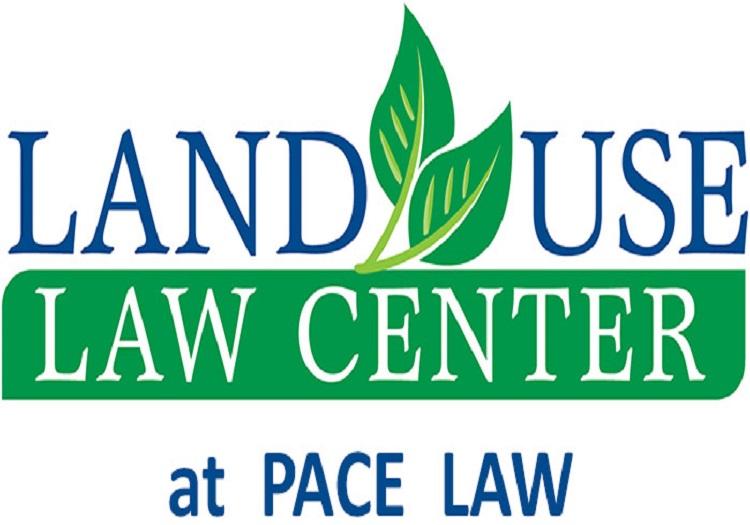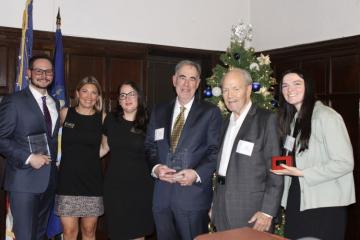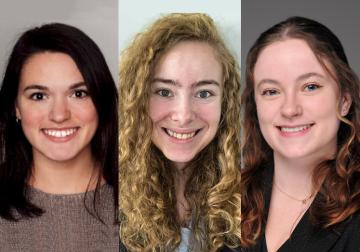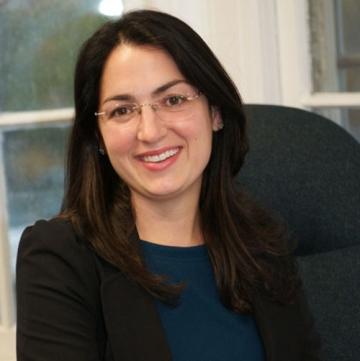Haub Law Celebrates the 25th Anniversary of the Land Use Law Center

WHITE PLAINS, NY – The Elisabeth Haub School of Law at Pace University (Haub Law) is proud to celebrate the 25th anniversary of the Land Use Law Center. The Center, established in 1993, was one of the first law-school based institutes in the nation whose mission was to engage communities in the movement toward more economically, equitably, and environmentally viable towns and cities.
In the past quarter of a century, the Center has worked tirelessly to create sustainable communities in Westchester County and beyond. The Center has demonstrated how land use law can be used by local leaders and citizens to:
- Reduce flooding;
- Create affordable housing;
- Mitigate climate change;
- Remediate distressed properties;
- Improve public health;
- Create sustainable neighborhoods;
- Create resilient waterfronts;
- Preserve local farms;
- Prevent water pollution; and
- Promote renewable energy.
“All of these issues deeply affect Hudson Valley communities. We offer assistance on them in this region, as well as throughout the Northeast and nationally,” notes Professor and Executive Director, Jessica Bacher. “We deliver these services to communities through technical assistance and training local land use leaders, involving our talented students in each initiative. Our training programs have won national awards from the International City Management Association and the American Planning Association and have motivated dozens of local governments to send us legislative or mayoral resolutions of support.”
”When I founded the Land Use Law Center in 1993, one of my primary goals was to find new ways to create and foster sustainable communities,” said Professor John Nolon. “Over the years, the Center has met this goal by developing innovative land use strategies, research, education, training, and working at the grass-roots level with local land use leaders. The Center’s efforts have contributed nationally to the development of three frameworks of law: sustainable development, local environmental law, and climate change mitigation.”
The Center’s list of accomplishments is long and noteworthy. It has worked in coastal communities on resilience, in cities on revitalizing areas afflicted with blight, and creating affordable housing, and building healthier, more liveable neighborhoods. It has done extensive work on water conservation in Colorado, and trained leaders and provided technical assistance in the Hudson Valley, Finger Lakes, Connecticut, Pennsylvania, New Jersey, and Utah.
The Center’s Land Use Leadership Alliance Training Program, founded in 1995,has conducted over 50 four-day training programs and graduated over 2,000 local leaders, over 85% of whom report that they have used the lessons learned successfully. These programs have been conducted in New York, New Jersey, Connecticut, Pennsylvania, Colorado, and Utah.
One of the seminal projects the Center advanced was development of the Hudson Park Transit Oriented Development in the City of Yonkers. This development demonstrated the benefits to the environment of transit-oriented development, a key climate change mitigation method. The Center knew that capturing the expanding population of the region in well-planned urban developments would counter sprawl, but – as the project progressed, it achieved several corollary benefits. Compared to other sprawling residential developments, Hudson Park reduces average per household impervious coverage by 96%, lowers per capita water use by 60%, and avoids disrupting wetland and watercourse environments needed for adaptation to climate change.
Leaders of the Center have published nearly 150 articles, a dozen books, numerous guidebooks and reports on best practices, and created local model environmental laws, and a solar energy law that is being adopted to promote renewable energy throughout New York State.
In addition to working with cities and states to achieve its mission, the Center has created an academic model by providing critical work for students to help communities as they learn practical skills that prepare them for practice upon graduation.
History of the Land Use Law Center
The Land Use Law Center, founded in 1993, was established to create sustainable communities. In 1992, the leaders of the countries of the world pledged their cooperative efforts in Rio de Janeiro to foster sustainable development to meet economic needs, achieve equity, and preserve resources for future generations. The Center was one of the first law school-based institutes of its kind in the country to dedicate itself to these goals.
The Center was commissioned by President Bill Clinton’s Council on Sustainable Development to study land use patterns in the Hudson Valley region and to determine whether the region would be sustainable in 50 years. Its conclusion was no: the region’s open space, and associated natural resources, would be reduced from 70% of the land area to 30% as a result of sprawl. This pattern of development was the direct result of the aggregated land use plans and regulations of the 250 local governments in the region. The Council asked the Center to develop a strategy to reverse these trends, and Congress, led by Congresswoman Nita Lowey, promised funding for a sound solution.
Leaders of the Center then met with Nobel Laureate in Physics, Dr. Murray Gell-Mann and leading land use law professor Michael Heyman, head of the Smithsonian Institution and former Chancellor of the University of California. Based on their successful experience with communities in the San Francisco Bay area and Dr. Gell-Mann’s work on grass-roots sustainability, they recommended that the Land Use Center train local land use leaders in using their considerable legal authority to build sustainable communities and to connect them by building inter-municipal networks.
The Center works with these well-respected leaders who identify their local land use problems and the staff attorneys and students at the Center conduct research nationally to identify relevant best practices for the leaders to consider and adapt locally. This program was awarded the American Planning Association’s national planning award in 2009 and received an award of distinction in 2014 from the International City Management Association. The Regional Plan Association credits the unique progress on sustainability in the Hudson Valley region, in part, to the Center’s training and research programs. The Center established a Land Use Collaborative with the Yale School of Forestry and Environmental Studies where Pace and Yale students work together studying sustainability issues and creating recommended strategies.
Past and current topics that local leaders have asked the Center to develop include: urban revitalization, transit oriented development, distressed property remediation, affordable housing, fair housing, gentrification, healthy communities, coastal resilience, inland flood prevention, local environmental law, clean water, renewable energy, agricultural land protection, climate change mitigation, and private/public partnerships, among others. The best practices developed are placed in the Gaining Ground Database for use by land use leaders and their advisers and they are used in a variety of outreach programs including the Center’s annual land use conference, local leader training programs, and regional workshops on breaking topics.
The Center works with local governments, non-profits, state agencies, foundations, developers, environmentalists, and sustainability advocates through a variety of partnerships. These include the Mayors Redevelopment Roundtable and the Corporation Counsels Roundtable, which it created, the New York State departments of State, Environmental Conservation, Energy, and Agriculture and Markets, the Governor’s Storm Recovery Office, FEMA, Cornell University, the Westchester County Association, the Urban Land Institute, and Yale.
###
About Elisabeth Haub School of Law at Pace University
Pace University’s Elisabeth Haub School of Law, (Haub Law) offers J.D. and Masters of Law degrees in both Environmental and International Law, as well as a series of joint degree programs including a Doctor of Juridical Science (SJD) in Environmental Law. The school, housed on the University’s campus in White Plains, NY, opened its doors in 1976 and has over 8,500 alumni around the world. The school maintains a unique philosophy and approach to legal education that strikes an important balance between practice and theory. For more information visit http://law.pace.edu.
About the Land Use Law Center
Established in 1993, the Land Use Law Center is dedicated to fostering the development of sustainable communities and regions through the promotion of innovative land use strategies and dispute resolution techniques. Through the work of its programs, centers, and institutes, the Land Use Law Center offers training, technical assistance, conferences, seminars, clinics, academic law school courses, continuing legal and planning education programs, audio podcasts, and frequent publications and resources on contemporary land use, real estate, and environmental issues. Visit https://law.pace.edu/landuse for more information.



